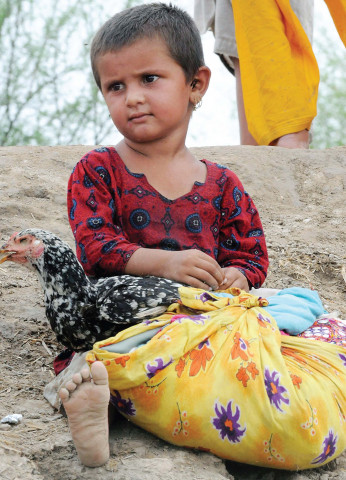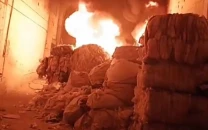Gilani issues SOS as floods reach Sindh

Gilani issues SOS as floods reach Sindh
“Pakistan has been hit by the worst floods in its history. I ask the international community to support and help Pakistan alleviate the sufferings of the flood-affected people,” Gilani said in a televised address to the nation
“We are passing through very critical times but courageous nations face such difficulties with strong will and determination,” Gilani said, adding that floods were engulfing new areas even as he spoke. “The loss of human lives and infrastructure has been colossal and real assessment of damages can only be done when the water recedes.”
Earlier, the National Disaster Management Authority (NDMA) chairperson General (retd) Nadeem Ahmed attempted to capture the scale of the disaster, saying the floods were a much greater disaster than the 2005 earthquake. “In 2005, only 30,000 square kilometres of area was affected but in this case, 132,000 square kilometres have been affected in just Khyber-Pakhtunkhwa and Punjab. The total population affected by the earthquake was 3.2 million but the floods have affected 12 million people in the two provinces,” he said.
Sindh
The discharge at the Guddu Barrage was 962,000 cusecs, while the water level at Sukkur Barrage was constantly rising on Friday.
At the Sukkur Barrage, an inflow of 720,000 cusecs was recorded on Friday evening, while downstream discharge was 696,000 cusecs. However, all vulnerable embankment walls remained intact, sustaining tremendous pressure.
According to reports from Kashmore and Ghotki districts, almost the entire katcha area was flooded on Friday and 90 per cent of the residents were moved to safer places. Army, navy and rangers personnel evacuated 15,000 people. In Sukkur, most residents of Katcha Bunder moved into a relief camp. According to the relief camp’s managers, 100 families comprising 875 people were registered on Friday and were provided food and medicines. Others have moved outside the Bunder wall and are living in make-shift homes.
Meanwhile, Chief of Army Staff (COAS) General Ashfaq Parvez Kayani, Sindh Chief Minister Qaim Ali Shah, Sindh Irrigation Minister Jam Saifullah Dharejo, federal Minister for Water and Power Raja Pervaiz Ashraf and federal Minister for Labour and Manpower Khursheed Ahmed Shah visited the Sukkur Barrage where they were briefed about the flood situation.
Federal Minister Water and Power Raja Pervaiz Ashraf told reporters at the barrage that the government’s timely efforts had saved the Kot Addu and Guddu power plants, adding that they were still functioning. He said that the government’s top priority was to evacuate marooned people who had lost their houses, cattle and other possessions.
Punjab
A flood spell in River Chenab is expected to hit Multan on Saturday and authorities have decided to break down the eastern dike of the Muzaffargarh Link Canal. The move is likely to save the Parco oil refinery but it will submerge more than 13 villages around Mehmood Kot.
The union council of Rajanpur was completely submerged on Friday while 6,000 small towns in Rahim Yar Khan were inundated, irrigation department authorities said.
DCO Dr Ahmed Javed Qazi said that at least 1,500 people were busy in relief operations. The flood also hit the Lal Pir thermal power station and the Kapco thermal power station.
A flood torrent of 1.1 millioncusecs from River Indus was heading towards Muzaffargarh where rescue and evacuation operation had begun, Rescue 1122 sources said.
Roads links have been disrupted in Kot Addu, Daira Din Panah, Ihsanpur and other villages where people are facing acute shortages of food. Railway channels have also been submerged and more than 10,000 people were stranded in Kot Addu and Muzzafargarh. Heavy rains were continuing in the region which is hampering rescue operations.
(With reporting by Sarafaraz Memon in Sukkur and Owais Jaffery in southern Punjab)
Published in The Express Tribune, August 7th, 2010.



















COMMENTS
Comments are moderated and generally will be posted if they are on-topic and not abusive.
For more information, please see our Comments FAQ